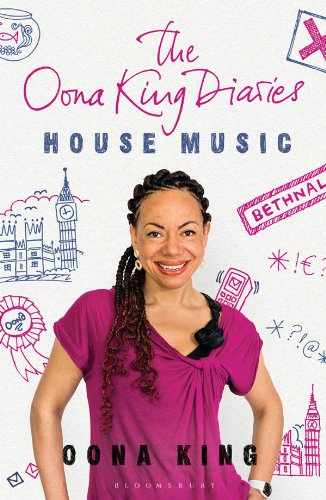Oona King House Music
My book House Music was published in 2007 and is an inside look at what it's really like to work in Parliament while juggling 'normal' life at the same time. It's about to be released as an ebook, details here shortly. This is an interview I gave shortly after publication.
What is House Music about?
It's about my 10 years in the House of Commons; two years as an assistant, and eight years as an MP. It's about the House of Commons but also about normal life, so it's not a 100% politics. In fact, people that are tightly obsessed with politics might be a bit disappointed when they read it, because it's really a sort of rich tapestry, and all of that. It's about how you survive, if you can, in the House of Commons.
Why did you write it?
I wrote it because it was my diary. My mum gave me a diary when I was 11, but I'm not one of those people that writes in it every night. In fact, there are times when I haven't written in it for months and months at a time. It's not meant to be a daily diary. Rather, it's a snapshot of what life was like at the House of Commons.
Do you miss Parliament?
I miss certain things about Parliament a lot. I miss the fact that it's a brilliant place for debate. It's where Britain debates what we do in our life, in our country, and for the future. But I don't miss it enough to go back there, because there are so many other things that come with being a member of Parliament that I wouldn't want to go back to. The mental hours that you work. The crazy environment, as well. So I do miss it, but, as I said, not enough to go back.
Would you go back to Parliament if a constituency was offered?
Not at the moment. Absolutely not. For me, personally, right now, I can't imagine ever going back. But if there's one thing you learn in politics, it's never say never. I've been asked to stand in a couple of safe seats very recently and I said no. I didn't put my name forward for the selections. A lot of people think, "Oh, she's an MP. She's a politician". Well, I'm obviously not an MP but I am "a politician. "She can't resist it. She'll have to go back." And it's not true.
If you were Prime Minister for the day what would you change?
If I was Prime Minister there are policy areas that I would change immediately. We are putting a lot of money into social housing and Gordon Brown has really prioritized that, a Housing Minister in the cabinet is amazing, that's fantastic. I would make it even more of a priority. I don't think that people understand how it ruins your life if you don't have a house. Kids, it affects their education, even if you do have a house but it's poor housing, etcetera, it affects your health, it affects your prospects, everything. So if I were Prime Minister for a day I would assure that they quadrupled, or even more, the number of socially affordable housing that we're building. I would also look at youth services really radically because people say that, "Oh and social behavior, young people they're out of control, etc etc." But we need to do much more; we need to give young people a real voice. And the other thing I'd do, I'd try and make it a long day maybe, the other thing I'd do is I'd really change the way we do politics. I would say politicians have to change; they have to give up some of their power so that other people can be involved, normal people. I'm not saying politicians aren't always normal but ordinary people who aren't obsessed with politics have to be able to have a voice in their community and I'd change the way that we involve people in politics.
Do you hold any grudges about the way you left Parliament?
In general, in life, I'm not the sort of person to hold a grudge. Mainly because I've got quite a bad memory. And in politics you know you inevitably have people who hate your guts. Some of them because they have good reason to - because they've met you and they don't like your policies and they don't like you. And a lot of people just because they love to hate politicians. And I would never remember, with the notable exception of about three people, because I just couldn't be bothered. Having said that, no matter how bad my memory is I can't quite forget the nature of the 2005 general election, in (Bethnal Green and Bow). And although I don't hold grudges, I do think it was ashamed that in Britain we had an election that was really marred by a lot of intimidation. So, I don't hold a grudge, but I don't think it was a great way to engage in political debate.
Would you do anything differently?
As you'd expect, I certainly wouldn't vote for war in Iraq, because I don't think that George Bush and anyone in the American administration has the slightest possibility of being able to do what you need to do after you invade a country. In Sierra Leone, Britain went in, we did the job, but then we actually knew what to do afterwards to help rebuild the society. And when I visited Hurricane Katrina, the aftermath of it in New Orleans, I was really amazed that the Americans, the strongest power on the planet, had no clue and were incapable of rebuilding a city inside their own national borders. So that really brought home to me that it doesn't matter that it was -- in my view -- right to get rid of Saddam Hussein, it was right I think, because he was a genocidal murderer. Just because George Bush gets away with murder doesn't mean that Saddam Hussein should get away with genocide. So I would do that differently. But overall I wouldn't change anything else, and even now thinking about it, I had a really amazing opportunity to be an MP, I changed the law in five areas and helped change it in many others. And so I don't regret that opportunity, and I can't regret doing what I thought was right at the time, because I really did think it was right to get rid of Saddam Hussein.
So I definitely regret voting for the Iraq war. I don't regret thinking it was absolutely right getting rid of a genocidal murderer when the opportunity arose The problem is if you're doing it with the most powerful country in the world who doesn't actually, it turns out, have any clue about how you rebuild a country then you're destined not just for failure, but for ongoing catastrophe of a level that is quite unimaginable. Yes I do regret it. What I regret most really though is that during that time in 2003 the fate of the world rested on the whims of madmen - George Bush on the one hand and Saddam Hussein on the other. You know Jenna said to me recently, but how can you oppose George Bush, I mean obviously anyone with a brain would oppose George Bush, and yet support going to war in Iraq. And to me that's a really strange question cause i could turn that around and say how could you oppose Saddam Hussein and yet not want to go to war in Iraq. It wasn't a win-win situation though, because leaving Saddam Hussein in power meant he would carry on doing what he had done. And one of the really strong reasons that I wanted to vote to get rid of Saddam Hussein was that the United Nations said he had manipulated the oil-for-food program, the UN oil-for-food program, and that his actions resulted in the deaths of half a million Iraqi children. So I just think on both sides of the argument people have to remember leaving Iraq alone, being pro-peace, does actually mean saying okay, well let those half a million children die. We'll let the Iraqi's die. Nonetheless, looking at the situation now it was wrong. The way the war was prosecuted was absolutely wrong. So, although I think it was right to get rid of Saddam Hussein, it was done in a way that was so wrong nothing can make right that wrong.

